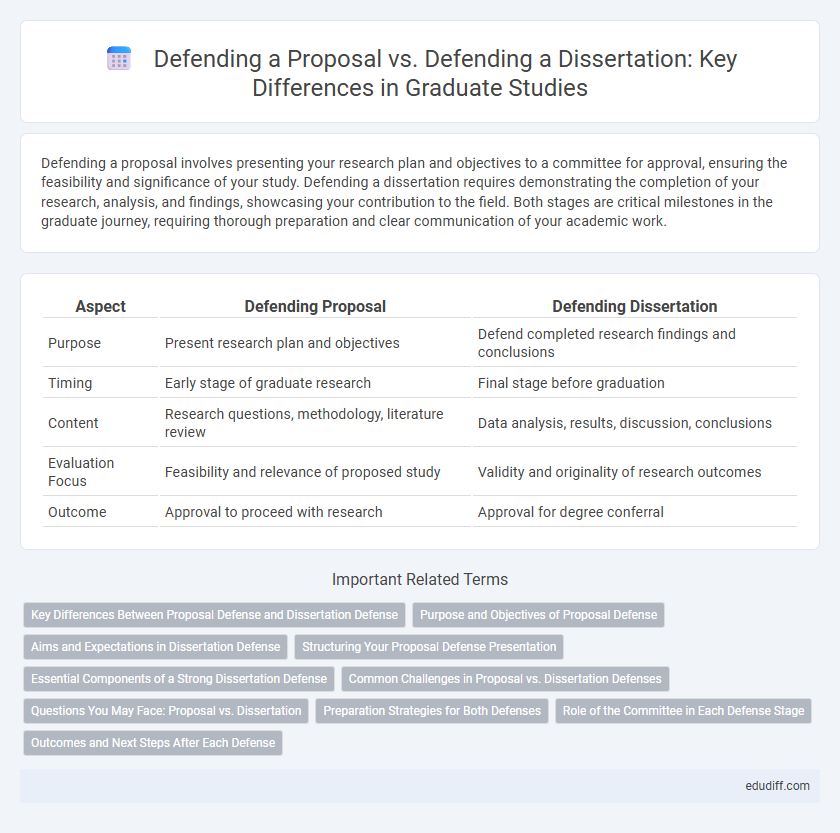Defending a proposal involves presenting your research plan and objectives to a committee for approval, ensuring the feasibility and significance of your study. Defending a dissertation requires demonstrating the completion of your research, analysis, and findings, showcasing your contribution to the field. Both stages are critical milestones in the graduate journey, requiring thorough preparation and clear communication of your academic work.
Table of Comparison
| Aspect | Defending Proposal | Defending Dissertation |
|---|---|---|
| Purpose | Present research plan and objectives | Defend completed research findings and conclusions |
| Timing | Early stage of graduate research | Final stage before graduation |
| Content | Research questions, methodology, literature review | Data analysis, results, discussion, conclusions |
| Evaluation Focus | Feasibility and relevance of proposed study | Validity and originality of research outcomes |
| Outcome | Approval to proceed with research | Approval for degree conferral |
Key Differences Between Proposal Defense and Dissertation Defense
Proposal defense involves presenting a research plan outlining objectives, methodology, and significance, aiming to get approval to proceed. Dissertation defense requires demonstrating completed research findings, data analysis, and conclusions to validate original contributions to the field. Key differences include timing--proposal defense occurs before data collection, while dissertation defense happens after research completion--and evaluation focus, shifting from feasibility to scholarly impact.
Purpose and Objectives of Proposal Defense
The purpose of defending a proposal is to present and justify the planned research objectives, methodology, and significance to a committee, ensuring the study's feasibility and scholarly contribution. The proposal defense aims to obtain approval and constructive feedback to refine the research direction before data collection begins. This process validates the research design and confirms alignment with academic standards and ethical guidelines.
Aims and Expectations in Dissertation Defense
Defending a proposal primarily aims to outline the research plan, including objectives, methodology, and theoretical framework, setting expectations for feasibility and scholarly contribution. In contrast, the dissertation defense focuses on demonstrating the completed research's validity, analysis, and conclusions, with evaluators expecting comprehensive understanding and original contributions to the field. Success in dissertation defense requires clear articulation of findings, justification of research decisions, and ability to address critical feedback from a committee of experts.
Structuring Your Proposal Defense Presentation
Structuring your proposal defense presentation requires a clear introduction of your research problem, objectives, and significance, followed by a detailed explanation of your proposed methodology and expected outcomes. Emphasize the research questions and literature review to establish a strong foundation for your study. Use visual aids to highlight key points, ensuring a logical flow that prepares your committee for the transition to the dissertation defense stage.
Essential Components of a Strong Dissertation Defense
A strong dissertation defense requires a clear presentation of the research problem, methodology, and key findings, demonstrating deep understanding and original contribution to the field. Essential components include effectively addressing committee questions, articulating the significance of results, and providing a coherent narrative from proposal to final conclusions. Emphasizing the alignment between the proposal's objectives and the dissertation's outcomes ensures a comprehensive and persuasive defense.
Common Challenges in Proposal vs. Dissertation Defenses
Graduate students face common challenges in both proposal and dissertation defenses, such as articulating research significance and justifying methodology. Proposal defenses often emphasize establishing a clear research plan and theoretical framework, whereas dissertation defenses demand comprehensive data analysis and interpretation. Navigating committee feedback and managing presentation anxiety are critical hurdles in both stages of graduate research defense.
Questions You May Face: Proposal vs. Dissertation
During a proposal defense, questions primarily focus on the research objectives, methodology, and theoretical framework to evaluate the feasibility and significance of the proposed study. In contrast, dissertation defense questions delve deeper into data analysis, results interpretation, and conclusions drawn, assessing the validity and contribution of the completed research. Understanding these distinct question types prepares graduates to effectively address the expectations at each stage of their academic journey.
Preparation Strategies for Both Defenses
Preparing for defending a proposal involves thoroughly reviewing the research objectives, literature review, and methodology to clearly justify the study's significance and feasibility. In contrast, defending a dissertation requires comprehensive understanding and presentation of research findings, data analysis, and implications to demonstrate scholarly contribution and mastery of the subject. Effective strategies for both defenses include practicing clear, concise communication, anticipating committee questions, and engaging with faculty feedback to refine arguments and address potential weaknesses.
Role of the Committee in Each Defense Stage
The committee plays a crucial role in both defending the proposal and the dissertation, focusing initially on evaluating the feasibility, clarity, and research design during the proposal defense. In the dissertation defense, committee members assess the originality, methodology, data analysis, and contribution to the field, ensuring the research meets academic standards. Their feedback and approval are essential for progressing from the proposal phase to successful degree completion.
Outcomes and Next Steps After Each Defense
Defending a proposal typically results in approval of the research plan, allowing the graduate student to proceed with data collection and analysis under faculty guidance. After proposal defense, next steps include refining the research methodology and securing necessary resources or ethics approvals. Defending a dissertation culminates in the evaluation of completed research, leading to degree conferral upon successful defense and completion of final revisions.
Defending Proposal vs Defending Dissertation Infographic

 edudiff.com
edudiff.com